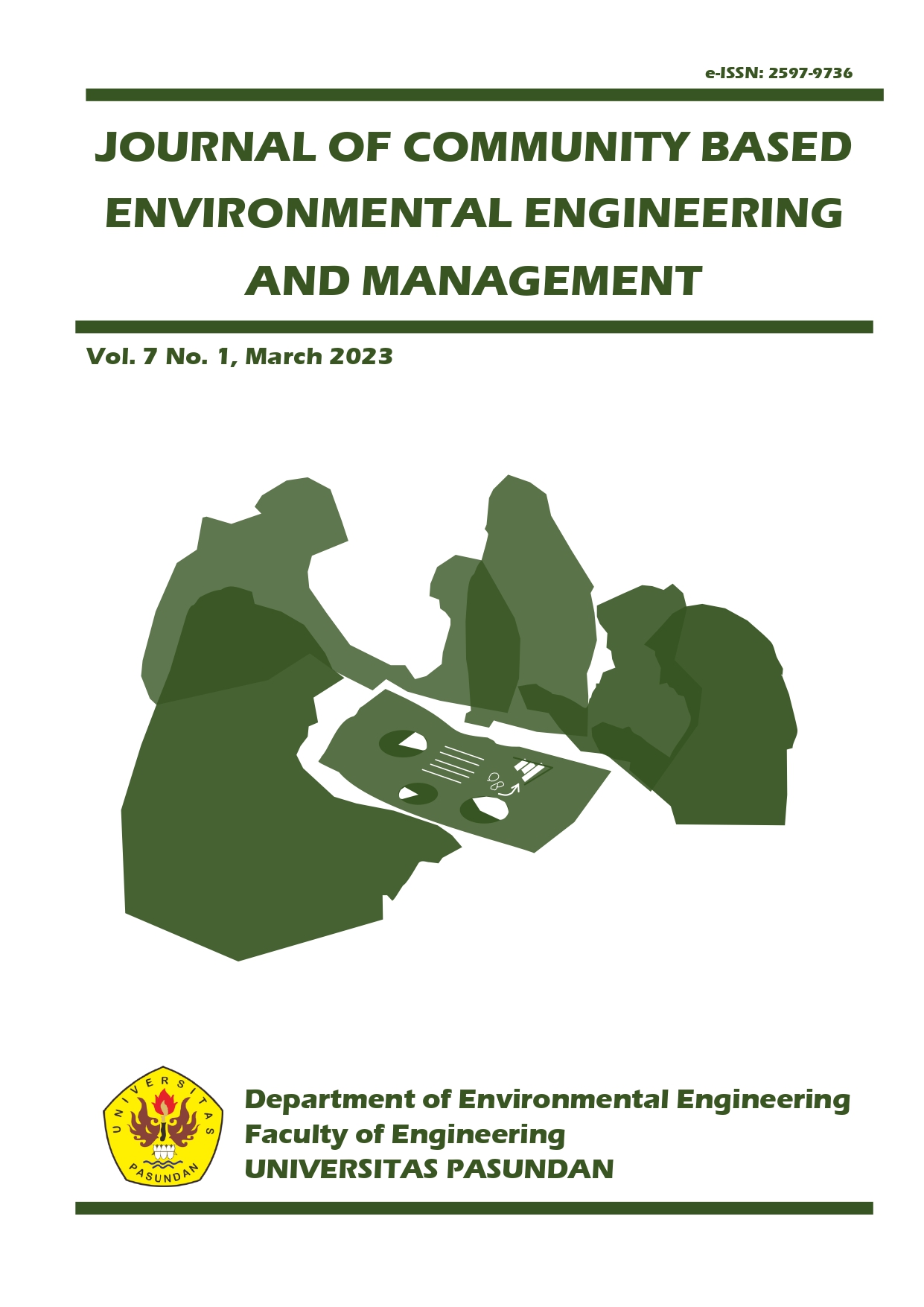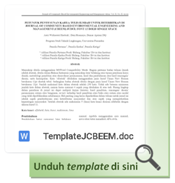Community Conceptions and Perceptions of Climate Change Mitigation and Adaptation in Ternate
DOI:
https://doi.org/10.23969/jcbeem.v7i1.6870Keywords:
adaptation community perception, climate change, mitigationAbstract
The community's input on climate change issues in the city of Ternate is urgently needed. The purpose of this study is to document how the people of Ternate City understand and respond to issues of climate change mitigation and conditions. This study used a community-based participatory research method involving 30 people consisting of community members, teachers, lecturers, and students. Focus group discussions (FGD) and photovoices were conducted to obtain data on causes, impacts and solutions to climate change problems in the city of Ternate. The research results confirmed that the people in the city of Ternate feel the negative impacts of climate change in the city, such as reduced water sources, loss of plant vegetation (for example: mangroves, sago and sea grass), reduced marine habitats, floods and landslides at several points, increased sea level. The main causes of climate change in the city of Ternate are the establishment of non-environmentally friendly development policies, the lack of public knowledge and awareness of climate change adaptation, and the lack of regional regulations at the city to village levels related to environmental issues. The solutions offered by the community are very diverse but according to the community, the government and young people need to conduct education, mitigation, and adaptation to climate changes in the city of Ternate.
Downloads
References
Azizah & Banowati. (2015). Pelaksanaan Sekolah Lapangan Iklim (Sli) dalam Memberikan Pemahaman Mitigasi Dan Adaptasi Perubahan Iklim Pada Petani di Kelurahan Banyurip Ageng Kecamatan Pekalongan Selatan. Jurnal Edu Geography, 3(6).
Badan Pusat Statistik Indonesia. (2018). Data Jumlah Desa dengan Risiko Bencana Tiga Tahun Terakhir. Badan Pusat Statistik Indonesia.
Buys, L., Miller, E., & Megen, K. V. (2012). Conceptualising Climate Change in Rural Australia: Community Perceptions, Attitudes and (in) Actions. Reg. Environ Change, 12, 237-248.
Carlie D. T. (2020) Children’s constructive climate change engagement: Empowering awareness, agency, and action. Environmental Education Research, 26(4), 532-554, DOI: 10.1080/13504622.2019.1675594
Chawla, L., & Heft, H. (2002). Children’s Competence and the Ecology of Communities: A Functional Approach to the Evaluation of Participation. Journal of Environmental Psychology 22(1–2), 201–216. doi:10.1006/jevp.2002. 0244
Crate, S. A., & Nuttall, M. (2009). Anthropology and Climate Change: From Encounters to Actions. Walnut Creek, CA: Left Coast Press.
David, R & Amy Cutter-Mackenzie-Knowles. (2020). A Systematic Review of Climate Change Education: Giving Children and Young People a ‘voice’ and a ‘hand’ in Redressing Climate Change. Children's Geographies, 18(2), 191-208, DOI: 10.1080/14733285.2019.1614532
Dalelo, A. (2011). Global Climate Change in Geography Curricula for Ethiopian Secondary and Preparatory Schools. International Research in Geographical and Environmental Education, 20(3), 227–246
Ekpoh, U. I., & Ekpoh, I.J. (2011). Assessing the Level of Climate Change Awareness among Secondary School Teachers in Calabar Municipality, Nigeria: Implication for Management Effectiveness. International Journal of Humanities and Social Science, 1(3), 106–110.
Fisher, M.R., Bettinger, K.B., Lowry, K., Lessy, M.R., Salim, W., & Foley, D. (2022). From Knowledge to Action: Multi-Stakeholder Planning for Urban Climate Change Adaptation and Resilence in the Asia-Pasific. Socio-Ecological Practice Research, 4, 339-353.
Gabrys, J. (2016). Program Earth: Environmental Sensing Technology and the Making of a Computational Planet. Minneapolis: University of Minnesota Press.
Hatmojo, D.S. (2020). Efektivitas Pelaksanaan Penyuluhan Pengendalian Perubahan Iklim Dan Kehutanan di Madrasyah Aliyah Aulia Cendekia Palembang. Jurnal Ilmiah Management Agribisnis, 1(1).
Hicks, D., & Holden, C. (2007). Remembering the Future: What Do Children Think? Environmental Education Research 13(4), 501–512. doi:10.1080/1350462070158159
Indeks Rawan Bencana Indonesia, 2020 (http://mpbi.info/irbi/indeks_risiko_bencana_indonesia/)
Intergovernmental Panel on Climate Change. (2020). Climate Change 2020: Synthesis Report. Contribution of Working Groups I, II and III to the Fifth Assessment Report of the Intergovernmental Panel on Climate Change. Geneva, Switzerland: IPCC.
Intergovernmental Panel on Climate Change. (2018). Climate Change 2018: Synthesis Report. Contribution of Working Groups I, II and III to the Fifth Assessment Report of the Intergovernmental Panel on Climate Change. Geneva, Switzerland: IPCC.
Kagawa, F., & Selby, D. (2012). Ready for the Storm: Education for Disaster Risk Reduction and Climate Change Adaptation and Mitigation. Journal of Education for Sustainable Development 6 (2), 207–217.
Lahay, R.J, Koem, S., & Nasib, K. (2020). Adaptasi Perubahan Iklim Berbasis Masyarakat Melalui Pendekatan Ekosistem di Desa Ilodulunga Kabupaten Gorontalo Utara. Jurnal Penelitian dan Pengabdian Kepada Masyarakat UNSIQ, 7(2), 170 – 178
Landrigan P.J, Stegeman J.J, & Fleming, L.E, (2020). Human Health and Ocean Pollution. Ann Glob Health, 86(1), 151. doi:10.5334/aogh.2831
Lowe, T., Brown, K., Dessai, E., de Franca Doria, M., Haynes, K & Vincent, K. (2006). Does Tomorrow Ever Come? Disaster Narrative and Public Perceptions of Climate Change. Public Understanding of Science, 15, 435–457.
McNeill, J. R., & Engelke P. (2014). The Great Acceleration: An Environmental History of the Anthropocene Since 1945. Cambridge, MA: Harvard University Press.
Monroe, M. C., R. R., Plate, A., Oxarart, A., Bowers, & Chaves, W.A. (2017). Identifying Effective Climate Change Education Strategies: A Systematic Review of the Research. Environmental Education Research, 25(6), 791–812. doi:10.1080/13504622.2017.1360842.
Ramadhani, R.M. (2020). Implementasi Program Sekolah Aman Bencana di Sekolah Menengah Kejuruan Negeri 4 Balikpapan Kalimantan Timur. Jipsindo, 2(7).
Sari, P.N., Aprisina, J., & Jannah, M. (2019). Pembinaan Masyarakat Menuju Kampung Peduli Iklim untuk Pencegahan Masalah Kesehatan dan Bencana di Jorong Jambu Air, Kec. Banuhampu, Kabupaten Agam. Jurnal Warta Pengabdian Andalas, 26(3), 151-160.
Scott A.O, Jenny R., & Sandra, F. (2021) Climate Change and Cultural Heritage: A Systematic Literature Review (2016–2020), The Historic Environment: Policy & Practice, DOI: 10.1080/17567505.2021.1957264.
Stokols, D., S. Misra, M. G., Runnerstrom, & Hipp, J.A. (2009). Psychology in an Age of Ecological Crisis: From Personal Angst to Collective Action. American Psychologist, 64(3), 181–193.
Syamsuddin, Alaa, & Ahyana (2020), Penerapan Pengurangan Resiko Bencana Menuju Sekolah Aman Bencana di Madrasah Aliyah Negeri 1 Mataram. Jurnal Pengabdian Pada Masyarakat, 5(2). DOI: 10.30653/002.202052.303.
Tarmana, D., Ulfah, A (2021). Peningkatan Pemahaman Informasi Iklim Melalui Sekolah Lapang Iklim (sli) bagi Petani. Jmm (Jurnal Masyarakat Mandiri), 5(2), 798-809.
Wardekker, A. (2021). Contrasting the Framing of Urgan Climate Resilience. Sustainable Cities and Society, 75, 103258, 1-13.














